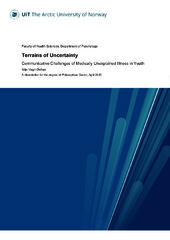| dc.contributor.advisor | Wang, Catharina Elisabeth Arfwedson | |
| dc.contributor.author | Østbye, Silje Vagli | |
| dc.date.accessioned | 2020-09-02T06:27:58Z | |
| dc.date.available | 2020-09-02T06:27:58Z | |
| dc.date.issued | 2020-09-29 | |
| dc.description.abstract | Persistent bodily symptoms without medical clarity creates many layers of uncertainty both for health professionals and for patients. In primary care, research has shown that clinical encounters of medically unexplained symptoms (MUS) are highly contentious, sometimes causing adverse effects. However, little is known about communicative challenges for adolescents in specialist health care settings; i.e. how they give meaning to their experiences, and how they handle social, moral and existential concerns. The overall aims of the present study were to explore these specific challenges of young MUS sufferers, and direct attention to how health care practices might support the youth's developmental processes. More precisely, in three different sites where uncertainty arose and had to be handled, I investigated how adolescents and health professionals positioned themselves within discourses and social structures to construct meaning by creating narratives and explanatory models. A multi-sited ethnographic approach and a triangulation of participatory qualitative methods was applied, including participant observation, life mode interviewing, focus groups and collaborative visual methods. Paper 1 demonstrates how a young boy made sense of his experiences of illness and disruptions of social life and future aspiration through a combination of personal and cultural themes. Paper 2 presents a conceptual model of methodological and epistemological paradoxes in specialist health care settings. Paper 3 shows how communicative challenges in a rehabilitation center are interactionally handled by adolescent patients and health professionals, leading to the construction of two categories of patients. By looking at how meaning is ascribed, how categories intersect, and experience is accounted for in the various contexts of this study, I offer a nuanced and contextualized understanding of the possibilities, challenges and limits among the subjects involved. With this study, I hope to contribute to a more reflexive and patient-centered practice by bringing attention to the different value systems and knowledge regimes that underpins clinical reasoning. | en_US |
| dc.description.doctoraltype | ph.d. | en_US |
| dc.description.popularabstract | Persistent bodily symptoms without medical clarity creates many layers of uncertainty both for health professionals and patients. Clinical encounters are shown in primary care studies to be highly contentious, sometimes causing adverse effects. However, little is known about communicative challenges for adolescents in specialist health care settings; how they give meaning to their experiences, and how they handle social, moral and existential concerns. This study explores these questions in order to understand young people’s experiences and direct attention to how health care practices can support them in their developmental processes. Using multi-sited fieldwork and different participatory qualitative methods, I demonstrate how health professionals and adolescents struggle to create meaning in three sites marked by uncertainty. For the young participants, the search for meaning was not contingent on clinical settings, but rather a continuous process of everyday life in which they sought accountability and future prospects. To develop health care systems that enable professionals to stay engaged and supportive of these processes should be of focus when seeking to adhere to the ideals of patient-centered care. The study contributes to a nuanced and contextualized understanding of illness and healing and makes visible the active processes of coping that young sufferers engage in together with their social environments. | en_US |
| dc.identifier.uri | https://hdl.handle.net/10037/19204 | |
| dc.language.iso | eng | en_US |
| dc.publisher | UiT The Arctic University of Norway | en_US |
| dc.publisher | UiT Norges arktiske universitet | en_US |
| dc.relation.haspart | <p>Paper I: Østbye, S.V., Kvamme, M.F., Wang, C.E.A., Haavind, H., Waage, T. & Risør, M.B. (2018). ‘Not a film about my slackness’: Making sense of medically unexplained illness in youth using collaborative visual methods. <i>Health, 24</i>(1), 38-58. Also available at <a href=https://doi.org/10.1177/1363459318785696>https://doi.org/10.1177/1363459318785696</a>. Accepted manuscript version available in Munin at <a href=https://hdl.handle.net/10037/13492> https://hdl.handle.net/10037/13492</a>.
<p>Paper II: Østbye, S.V., Wang, C.E.A, Granheim, I.P., Kristensen, K.E. & Risør, M.B. (2018). Epistemological and methodological paradoxes: Secondary care specialists and their challenges working with adolescents with medically unexplained symptoms. <i>International Journal of Mental Health Systems, 12</i>, 52. Also available in Munin at <a href=https://hdl.handle.net/10037/13869>https://hdl.handle.net/10037/13869</a>.
<p>Paper III: Østbye, S. V., Wang, C. E. A., Haavind, H. & Risør, M. B. The makings of ‘classic’ and ‘complex’ patients – an ethnographic study of clinical rehabilitation for adolescents with medically unexplained long-term fatigue. (Manuscript). | en_US |
| dc.rights.accessRights | openAccess | en_US |
| dc.rights.holder | Copyright 2020 The Author(s) | |
| dc.subject.courseID | DOKTOR-003 | |
| dc.subject | VDP::Social science: 200::Psychology: 260 | en_US |
| dc.subject | VDP::Samfunnsvitenskap: 200::Psykologi: 260 | en_US |
| dc.title | Terrains of Uncertainty. Communicative Challenges of Medically Unexplained Illness in Youth | en_US |
| dc.type | Doctoral thesis | en_US |
| dc.type | Doktorgradsavhandling | en_US |


 English
English norsk
norsk